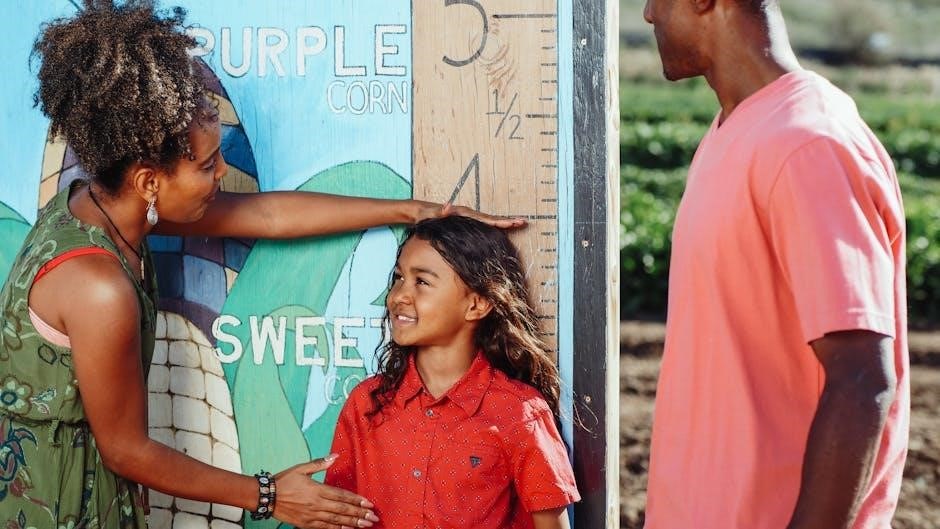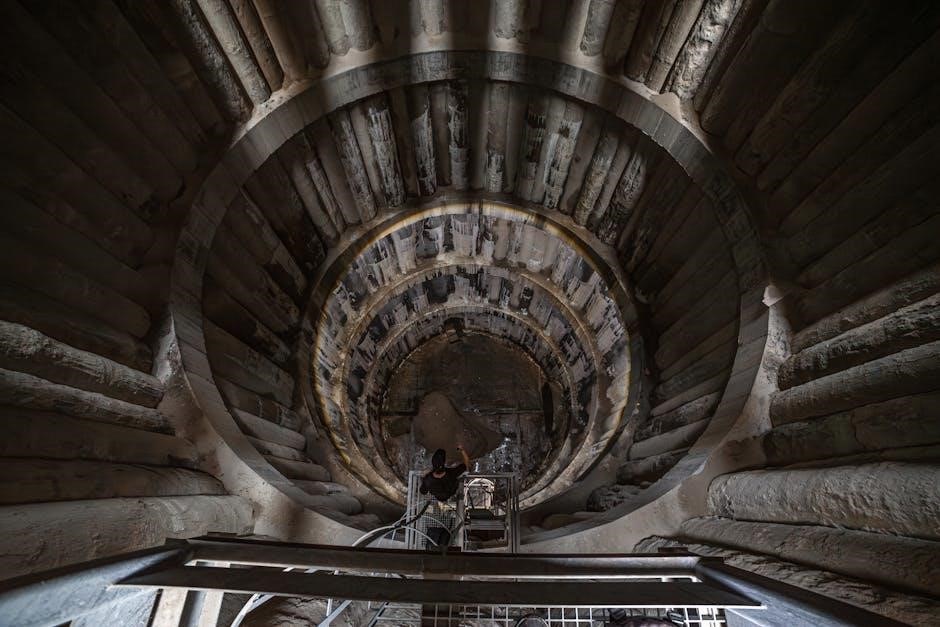The Rancho Los Amigos Scale is a widely recognized tool for assessing cognitive recovery after brain injuries. Originally developed with eight levels‚ it was later expanded to ten‚ providing a comprehensive framework to evaluate patient progress. Used by rehabilitation teams‚ including doctors and therapists‚ the scale helps determine appropriate rehabilitation strategies and monitor recovery effectively.
Overview of the Scale and Its Importance
The Rancho Los Amigos Scale is a crucial assessment tool for evaluating cognitive recovery in individuals with brain injuries. Initially developed with 8 levels‚ it was later expanded to 10 levels to provide a more detailed framework for tracking progress. This scale is essential in rehabilitation settings as it offers a standardized way to assess cognitive functioning‚ helping healthcare professionals tailor treatment plans. Its importance lies in its ability to monitor recovery stages‚ guide therapeutic interventions‚ and communicate a patient’s progress clearly. By providing a structured approach‚ the scale ensures consistency in assessing and supporting individuals with brain injuries‚ making it a cornerstone in rehabilitation practices.
Historical Background and Development
The Rancho Los Amigos Scale was developed in 1972 by Chris Hagen and his team at the Rancho Los Amigos National Rehabilitation Center in California. Initially designed as an 8-level scale‚ it was created to evaluate cognitive recovery in patients with brain injuries. The scale was later revised to include 10 levels‚ enhancing its ability to assess a broader range of cognitive functioning. Its development was grounded in the observation of patients’ behavioral responses‚ aiming to provide a standardized measure for rehabilitation teams. Over time‚ the scale has become a widely accepted tool in clinical practice‚ guiding rehabilitation efforts and improving patient outcomes. Its evolution reflects ongoing efforts to refine cognitive recovery assessment.

Structure of the Rancho Los Amigos Scale
The Rancho Los Amigos Scale is structured into 10 distinct levels‚ progressing from no response to purposeful‚ appropriate behaviors. It guides rehabilitation by assessing cognitive recovery.
Original Scale: 8 Levels of Cognitive Functioning
The original Rancho Los Amigos Scale (RLAS) was developed to assess cognitive recovery in brain injury patients and consisted of 8 distinct levels. Level I represents no response‚ where the patient appears unresponsive to stimuli. Level II involves generalized responses‚ with non-specific reactions to stimuli. Level III introduces localized responses‚ where the patient may recognize family or follow simple commands. Levels IV-VI describe varying degrees of confusion‚ from disoriented to confused but able to perform daily living tasks. Levels VII and VIII mark higher cognitive functioning‚ with purposeful behavior and near-normal functioning‚ respectively. This 8-level framework provided foundational insights into recovery progression.
Revised Scale: Expansion to 10 Levels
The Rancho Los Amigos Scale was later revised and expanded from 8 to 10 levels to provide a more detailed assessment of cognitive recovery. The revised scale‚ known as the Rancho Los Amigos Revised Scale (RLAS-R)‚ includes two additional levels to better capture subtle improvements in patient functioning. Level IX focuses on increased independence in daily activities‚ while Level X emphasizes community reintegration and near-normal cognitive functioning. This expansion allows for a more nuanced evaluation of recovery progress‚ enabling healthcare professionals to tailor rehabilitation strategies more effectively. The revised scale enhances the ability to monitor gradual improvements and set realistic goals for patients recovering from brain injuries.

Understanding the Levels of the Rancho Los Amigos Scale
The scale outlines a continuum of recovery‚ from no response to purposeful‚ appropriate behavior. It helps clinicians evaluate and guide patients’ progress effectively during rehabilitation.
Levels I-III: Lower Levels of Cognitive Functioning
The lower levels of the Rancho Los Amigos Scale represent the earliest stages of recovery from brain injury. Level I indicates no response‚ where the patient appears unresponsive to external stimuli. At Level II‚ patients exhibit generalized‚ non-specific reactions‚ such as stereotypic or limited responses‚ without clear purpose. Level III involves localized responses‚ where individuals may react to specific stimuli‚ such as vocalizing or withdrawing from pain‚ but remain largely dependent on assistance. These levels highlight the patient’s gradual progression from minimal awareness to slightly more focused‚ though still inconsistent‚ interactions with their environment. Understanding these stages is crucial for tailoring rehabilitation efforts to the patient’s cognitive state.
Levels IV-VIII: Higher Levels of Cognitive Functioning
Levels IV to VIII of the Rancho Los Amigos Scale represent advancing stages of cognitive recovery. At Level IV‚ patients exhibit confusion‚ agitation‚ and disorganized thinking but may respond inconsistently to commands. Level V involves more consistent responses‚ with patients showing emerging awareness of their surroundings. By Level VI‚ individuals demonstrate improved memory and problem-solving abilities‚ though they may still require support. Level VII is marked by automatic and purposeful responses‚ with patients able to perform daily tasks with minimal assistance. Finally‚ Level VIII signifies near-normal cognitive functioning‚ with appropriate and purposeful behaviors. These levels highlight the patient’s growing independence and ability to engage meaningfully with their environment.

Clinical Applications of the Rancho Los Amigos Scale
The Rancho Los Amigos Scale is crucial in rehabilitation settings for treatment planning and goal setting. It helps monitor patient progress and adjust recovery strategies accordingly.
Assessment in Rehabilitation Settings

The Rancho Los Amigos Scale is a cornerstone in rehabilitation settings‚ enabling healthcare professionals to systematically assess cognitive and behavioral recovery in patients with brain injuries. Rehabilitation teams‚ including doctors‚ therapists‚ and specialists‚ use the scale to evaluate a patient’s functional abilities and track progress over time. By assigning a specific level based on observed responses‚ the scale facilitates personalized treatment plans tailored to the patient’s needs. This standardized approach ensures consistency in assessment‚ allowing for accurate monitoring of recovery milestones. The scale’s clarity and structure make it an invaluable tool for guiding therapeutic interventions and setting realistic goals for patients as they progress through their rehabilitation journey.
Monitoring Progress and Recovery
The Rancho Los Amigos Scale is instrumental in monitoring the progress and recovery of patients with brain injuries. By regularly assessing a patient’s cognitive and behavioral responses‚ healthcare professionals can track improvements or plateaus in their condition. The scale’s structured levels provide clear benchmarks for measuring recovery over time‚ allowing for precise documentation of advancements. This consistent monitoring enables rehabilitation teams to adjust treatment plans accordingly‚ ensuring interventions are tailored to the patient’s evolving needs. The scale also helps identify when a patient is ready to transition to new stages of rehabilitation or reintegrate into daily activities‚ making it a vital tool for guiding long-term recovery strategies effectively.

Practical Use of the Rancho Los Amigos Scale
The Rancho Los Amigos Scale is a practical tool for daily clinical practice‚ enabling healthcare professionals to assess and document patient progress systematically. It ensures consistency in rehabilitation strategies and communication among team members‚ while also aiding in planning patient-specific interventions and tracking recovery milestones effectively.
Guidelines for Healthcare Professionals
Healthcare professionals should use the Rancho Los Amigos Scale to consistently assess cognitive recovery in brain injury patients. Accurate documentation of patient responses ensures reliable tracking of progress. Regular team communication is crucial to align rehabilitation strategies with the patient’s current level. Therapists should tailor interventions to the patient’s specific cognitive stage‚ fostering gradual improvement. Families should be educated about the scale to involve them in care decisions. Continuous training on the scale’s application ensures accuracy and consistency across the rehabilitation team. Regular updates and feedback sessions help refine treatment plans‚ optimizing patient outcomes and recovery trajectories.
Family and Caregiver Involvement
Families and caregivers play a vital role in supporting patients during recovery. Understanding the Rancho Los Amigos Scale helps them recognize the patient’s cognitive stage and provide appropriate assistance. Caregivers should engage in familiar activities to help the patient identify thinking challenges. Emotional support and a structured environment can aid recovery. Open communication with healthcare professionals ensures alignment in care strategies. Families should be educated on the scale’s levels to set realistic expectations and celebrate progress. Involving caregivers in therapy sessions fosters a collaborative approach‚ enhancing the patient’s rehabilitation journey. Their active participation promotes consistency in care and supports the patient’s gradual return to independence.

The Rancho Los Amigos Scale in Modern Practice
The Rancho Los Amigos Scale remains a widely used standardized measure describing cognitive and behavioral patterns in brain injury recovery. It guides modern rehabilitation practices effectively today.
Current Relevance and Usage
The Rancho Los Amigos Scale remains highly relevant in modern rehabilitation practices‚ serving as a standardized tool to assess cognitive recovery in brain injury patients. Its structured framework provides clarity for rehabilitation teams to develop tailored strategies and monitor progress effectively. Widely adopted in clinical settings‚ the scale continues to guide decision-making for rehabilitation readiness and patient care. Its application spans across various stages of recovery‚ from initial assessment to long-term rehabilitation planning. The scale’s ability to describe cognitive and behavioral patterns accurately ensures its ongoing utility in contemporary healthcare. It remains a cornerstone in rehabilitation medicine‚ aiding professionals in delivering personalized and evidence-based care to patients recovering from brain injuries.
Impact on Rehabilitation Practices
The Rancho Los Amigos Scale has significantly influenced rehabilitation practices by providing a standardized framework for assessing and monitoring recovery in brain injury patients. Its widespread adoption has improved the consistency and accuracy of rehabilitation strategies‚ enabling healthcare professionals to set realistic goals and track progress more effectively. The scale’s structured approach enhances communication among multidisciplinary teams‚ ensuring cohesive care plans. Additionally‚ it has facilitated research and clinical decision-making‚ contributing to advancements in rehabilitation medicine. By offering a clear understanding of cognitive and behavioral recovery patterns‚ the scale has become an indispensable tool in modern rehabilitation‚ ultimately improving patient outcomes and guiding evidence-based practices.

Resources and Further Reading
The Rancho Los Amigos Scale PDF is widely available online‚ offering detailed insights into its structure and application. Additional materials‚ such as guides and case studies‚ provide comprehensive understanding.
Accessing the Rancho Los Amigos Scale PDF

The Rancho Los Amigos Scale PDF is widely available online‚ offering easy access to its detailed framework. Users can download it from official medical websites or rehabilitation resources. The PDF provides a clear outline of the 10 levels of cognitive functioning‚ making it a valuable tool for healthcare professionals and families. It includes practical guidelines for assessing patient progress and monitoring recovery; Additionally‚ the PDF serves as a quick reference for understanding each stage of cognitive recovery‚ ensuring consistent application in clinical settings. By downloading the PDF‚ users can access a structured and comprehensive guide to support rehabilitation efforts effectively.
Additional Materials for Comprehensive Understanding
Beyond the Rancho Los Amigos Scale PDF‚ additional materials are available to enhance understanding and application. These include detailed guides for healthcare professionals‚ caregiver resources‚ and educational pamphlets. Case studies and progress tracking sheets are also accessible‚ providing real-world examples of recovery stages. Visual aids like infographics and charts help visualize the scale’s levels and transitions. These materials are often distributed alongside the PDF‚ offering a holistic approach to cognitive recovery assessment. Families and clinicians can benefit from these resources‚ ensuring consistent and informed care. By leveraging these tools‚ users can gain a deeper insight into the scale’s practical application and its role in rehabilitation planning.
